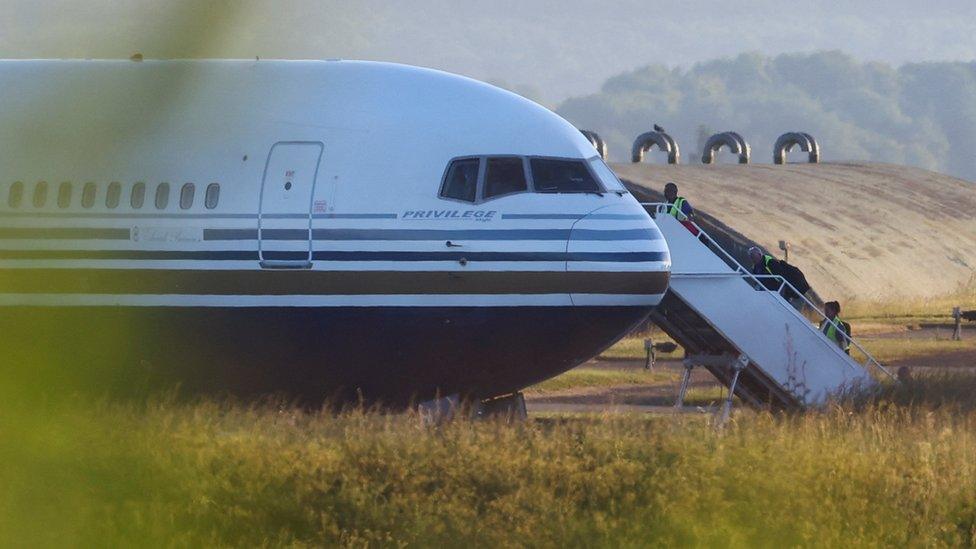Rishi Sunak's Rwanda bill to become law after late-night showdown
- Published
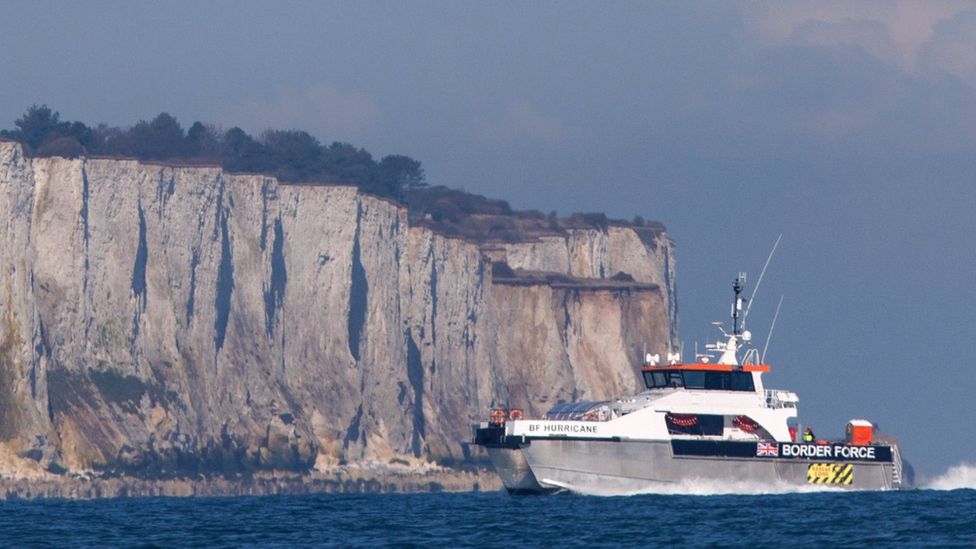
Rishi Sunak's Rwanda bill will finally become law after a parliamentary showdown ended late in the night.
Plans to send some asylum seekers to Africa have met with fierce criticism, but the bill passed on Monday when the Lords dropped their opposition.
Mr Sunak said in a statement "nothing will stand in our way" now of getting flights off the ground.
But the scheme could still be held up by challenges in the courts.
Ahead of the bill passing, the prime minister said flights to Rwanda would take off within 10 to 12 weeks, missing his original spring target.
In a statement on Tuesday, he called the passing of the Rwanda bill "not just a step forward but a fundamental change in the global equation on migration".
He said: "We introduced the Rwanda bill to deter vulnerable migrants from making perilous crossings and break the business model of the criminal gangs who exploit them.
"The passing of this legislation will allow us to do that and make it very clear that if you come here illegally, you will not be able to stay.
"Our focus is to now get flights off the ground, and I am clear that nothing will stand in our way of doing that and saving lives."
But shadow home secretary Yvette Cooper called the Rwanda plan an "extortionately expensive gimmick".
Charities have also hit out at the scheme, with leading human rights groups describing it as a "breach of international law".
During a live TV report by the BBC's home affairs correspondent Tom Symonds in Calais on Tuesday morning, a group of about 30 migrants boarded a small boat on the beach and could be seen heading out into the Channel towards the UK.
Asked about the moment shortly after during an interview on BBC Breakfast, Minister for Illegal Migration Michael Tomlinson said the bill passing was a "landmark moment", and that the deterrent would be felt when flights get off the ground.
"The numbers will start off small but there will be a regular rhythm of flights… thousands of people will eventually be removed to Rwanda and the deterrent effect will kick in," he said.
A lawyer representing some of those who could potentially be sent to Rwanda suggested there may be other routes to stop flights taking off.
Nicholas Hughes, a solicitor at law firm Duncan Lewis, represents dozens of people who were affected when the flights were first planned in 2022, and said they are likely to represent clients selected for potential future flights to Rwanda.
He said his clients would be given seven days' notice if they are chosen to be removed to Rwanda, giving him a "very brief window" to explain to the Home Office why they would be unsafe there.
A person's removal to Rwanda would be rendered unsafe, he said, if they had mental or physical health issues, or were a victim of trafficking or torture, but added that given the time frame, getting that medical evidence could be challenging.
Asked how certain he was that he would be able to prevent clients being sent to Rwanda, he said: "We'll do everything we can."
The government plans have been stalled since November, when the UK Supreme Court ruled unanimously that the Rwanda scheme was unlawful.
On Monday, the prime minister said flights were booked to take off as soon the legislation was passed and 500 staff were ready to escort migrants "all the way to Rwanda".
"Plans are in place. And these flights will go, come what may," he said, adding he wanted to create "a drumbeat of multiple flights a month... because that's how you build a systematic deterrent and that's how you'll stop the boats".
A gruelling parliamentary back-and-forth between the Commons and House of Lords saw the bill sent back to MPs five times before coming to an end.
After so many setbacks, the passing of the bill was a political win for the prime minister.
But his pledge to stop small boats crossing the Channel now hinges on this being the deterrent he has promised. With a general election close, the prime minister does not have long to prove his plan will work.
About 52,000 people could be sent to Rwanda under the law. These are asylum seekers - people who have sought the UK's protection and who have arrived without authorisation from another safe country. That essentially means people who have taken a dinghy to cross the English Channel.
Under the scheme, the UK government had paid £240m to Rwanda by the end of 2023. However, the total payment will be at least £370m over five years, according to the National Audit Office.
Under the new Rwanda legislation, If the European Court of Human Rights (ECHR) orders a flight to stay on the runway, ministers have created a new power to ignore that injunction.
The government says it can ignore the ECHR's "interim measures" - but most lawyers disagree and say that would be a breach of international law. It is possible that judges could later rule that a migrant deported to Rwanda had a genuine case - and order the government to return them to the UK. This has happened before, albeit rarely.
Shadow home secretary Yvette Cooper said the scheme was "an extortionately expensive gimmick" that would cost "half-a-billion pounds for just 300 people to be sent to Rwanda - less than 1% of asylum seekers".
Labour would instead boost border security, go after criminal gangs, enforce stronger powers and intelligence agreements and introduce fast-track systems in UK for a new returns and enforcement units, Ms Cooper said.
By Monday peers were debating two amendments to the bill, the first was for an independent monitoring committee be set up to consider if Rwanda was safe and a second for exemptions for Afghans who had assisted the British military.
On the bill, Lord Carlile said: "This is something which is ill judged, badly drafted, inappropriate, illegal in current UK and international law, and the House of Lords is absolutely right to say that we want to maintain our legal standards in this country, and there are better ways of dealing with this problem anyway."
'An extremely important concession'
Lord Browne of Ladyton, who put forward the amendment to exempt Afghan veterans who had assisted the British military from deportation, said there had now been a concession by the government on this.
The government pledged that Afghan veterans with a "credible link" to the Afghan special forces would have their claims reassessed by an independent body and said those with verified claims would not be deported.
Lord Browne said this was "extremely important" concession" and dropped his amendment.
Back in the Commons, shadow immigration minister Stephen Kinnock praised the "tenacity" of his colleagues in the Lords for holding out for what he also called "a significant concession".
But the government held firm on its rejection of the final amendment for a monitoring committee - put forward by crossbench peer Lord Anderson.
He said the purpose of the back-and-forth between the chambers was to persuade the government to agree a compromise but it had "refused pointedly to do so".
The time had come to acknowledge the "primacy of the elected house and to withdraw from the fray", he added.
Defending the bill, Home Office minister Lord Sharpe of Epsom said it complied with international law and that it was was "profoundly moral and patriotic to defend the integrity of our borders".
Royal Assent is expected to be given by King Charles in the next few days, officially passing the bill into law.
It is not just opposition parties who have objected to the government's Rwanda plan. Human rights groups say the plan poses a "significant threat to the rule of law" by undermining what protects people from an abuse of power by the state.
The charity Freedom from Torture, alongside Amnesty International and Liberty said in a statement: "We all deserve the chance to live a safe life, and to seek protection when we need it most.
"This shameful bill trashes the constitution and international law whilst putting torture survivors and other refugees at risk of an unsafe future in Rwanda."
Reform UK's leader Richard Tice said the plan would not act as a deterrent, and even if flights to Rwanda leave in 10 to 12 weeks, "thousands more are going to arrive, they're going to take their chance".
He said the only way to "stop the boats" was if Border Force "pick people up and take them back to France - that will break the business model and crucially stop people dying".

More on the UK's Rwanda asylum bill


What do you want to understand better about the Rwanda bill? Our experts will be answering your questions at 12:30 BST on the News Channel.
In some cases your question will be published, displaying your name, age and location as you provide it, unless you state otherwise. Your contact details will never be published. Please ensure you have read our terms & conditions and privacy policy.
Use this form to ask your question:
If you are reading this page and can't see the form you will need to visit the mobile version of the BBC website to submit your question or send them via email to YourQuestions@bbc.co.uk, external. Please include your name, age and location with any question you send in.
Related topics
- Published22 April 2024
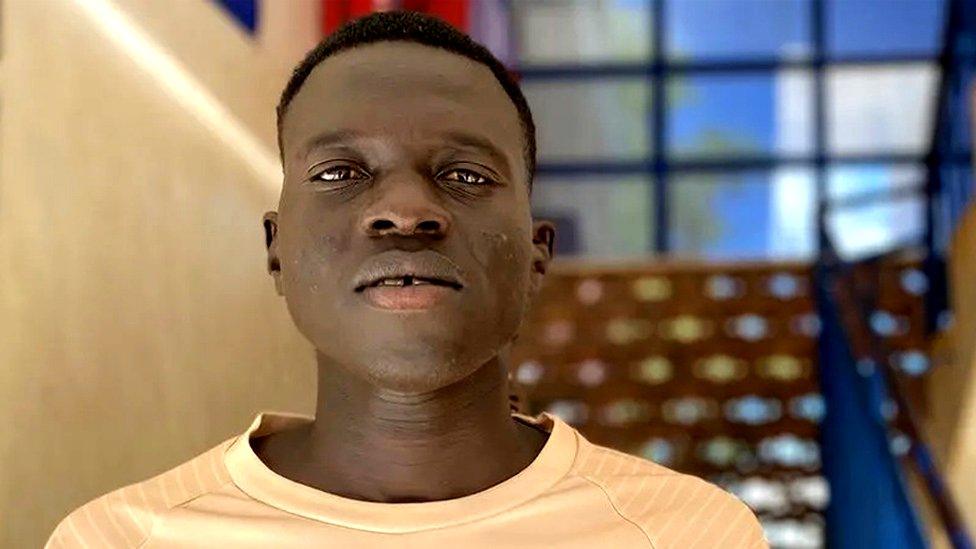
- Published23 April 2024
- Published22 April 2024
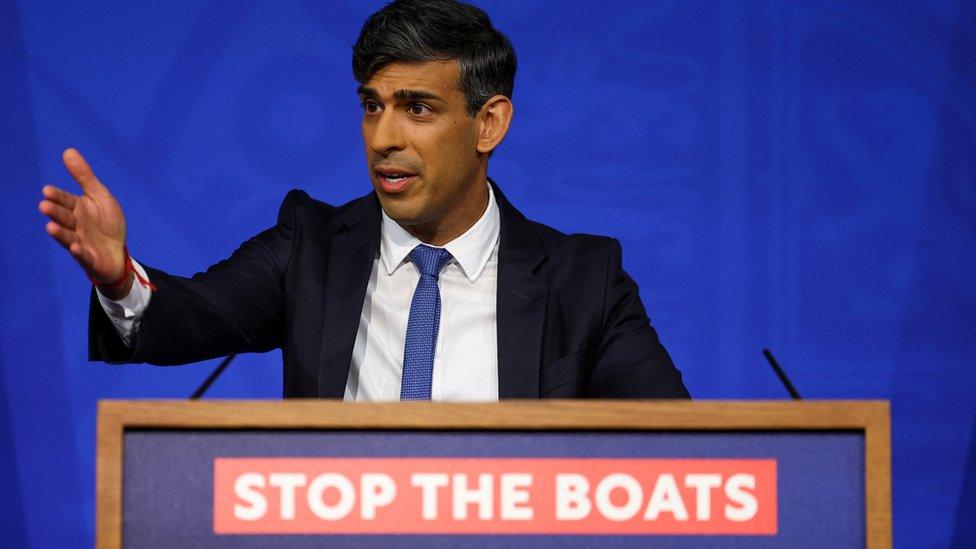
- Published22 April 2024
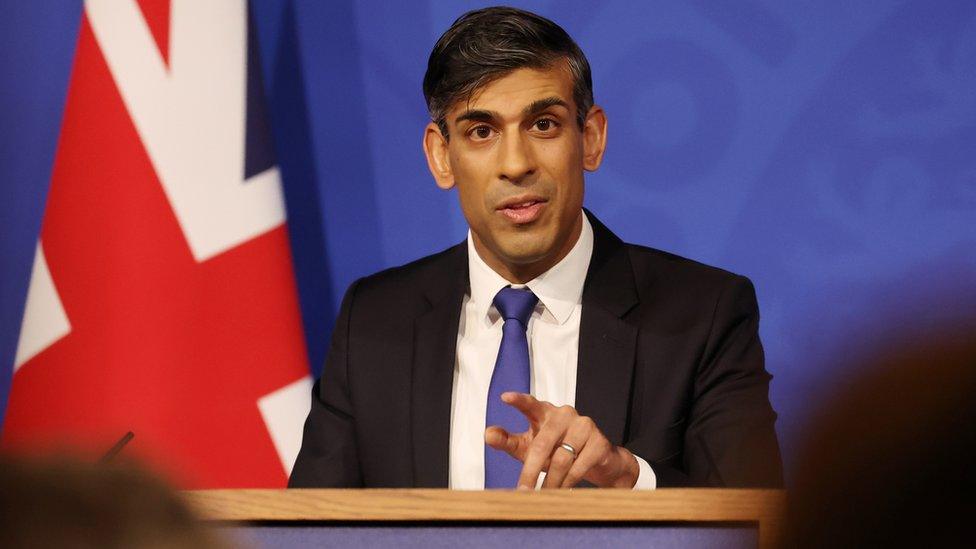
- Published17 April 2024
